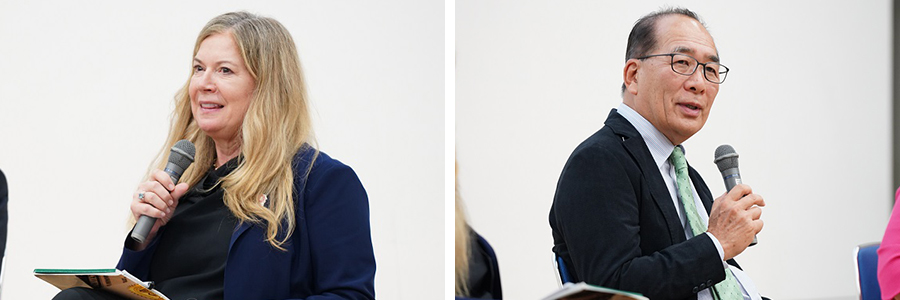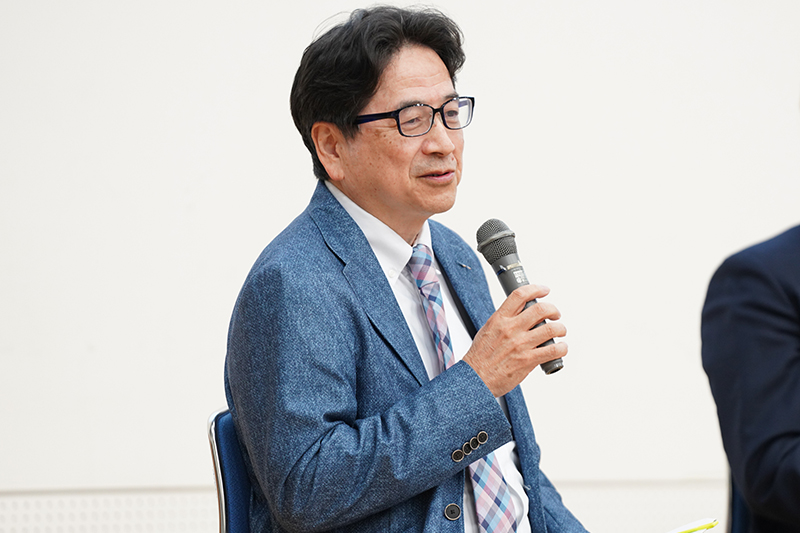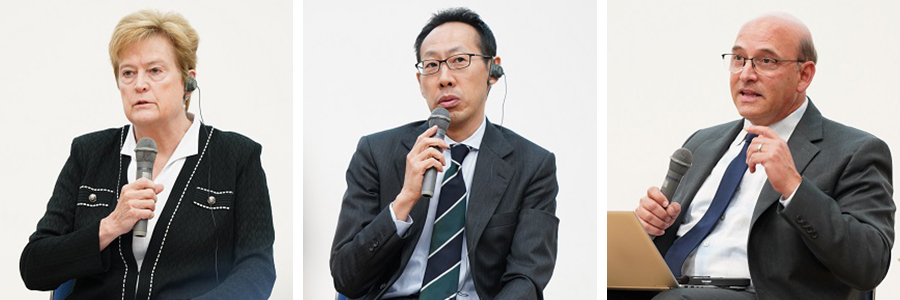Home> Announcements> International topics> Trilateral Cooperation (JPO-EPO-USPTO)> The JPO successfully concludes symposium on intellectual property and technology transfer
Main content starts here.
The JPO successfully concludes symposium on intellectual property and technology transfer
January 30, 2025
The Japan Patent Office (JPO) and the Institute of Science Tokyo co-hosted the Trilateral Patent Office Director and Users Meeting International Symposium: 42nd Trilateral Conference International Symposium on Tuesday, October 15, 2024 in Tokyo.
Subtitled “IP and Technology Transfer: Challenges and Successes with the Collaboration Framework among Academia-Industry-IP Offices”, the symposium was also supported by the European Patent Office (EPO), United States Patent and Trademark Office (USPTO), and World Intellectual Property Organization (WIPO). Additional support was also received from user groups in Japan, the U.S. and Europe—namely, the Japan Intellectual Property Association (JIPA), American Intellectual Property Law Association (AIPLA), Intellectual Property Owners Association (IPO), and Business Europe (BE).
The purpose of the symposium was to discuss the diverse realities of intellectual property (IP) management in the process of transferring technology born within universities to the industrial sector. Discussions included the respective positions of industry, government, and academia in Japan, the U.S. and Europe.
Note that all the positions of the speakers listed on this page are as of the time of the event.
1. Opening Remarks
The symposium’s opening remarks were delivered by Commissioner ONO (JPO), who emphasized the importance of innovative technologies emerging from universities in advanced fields. He also expressed hope that this symposium would provide insights for promoting technology transfer and social implementation in Japan and around the world—as well as for utilizing IP—and that this would deepen the pursuit of knowledge.

Opening remarks
2. Keynote Speech
A keynote speech was given by Dr. OHTAKE, President and Chief Executive Officer of Science Tokyo, from the perspective of academia on the creation of innovation, as well as how the effective use of IP can contribute toward solving social issues.

Keynote speech
3. Panel Discussion A: Social Implementation of Technology developed by Academic Research Institutions through Startups - Challenges and Solutions for Success
During this panel, the following moderators and panelists took the stage to share their insights on efforts to commercialize academic technologies through startups.

Panel discussion A. From left to right: Dr. IIDA (Science Tokyo), Mr. ONO (JPO), Ms. Vidal (USPTO), Dr. NAKAUCHI (Science Tokyo), Ms. Wainikka (BE)
Moderator
- Dr. IIDA Kaori, Vice President for Industry-Academia Government Collaboration of Science Tokyo
Panelists
- Mr. ONO Yota, Commissioner of the JPO
- Ms. Kathi Vidal, Under Secretary of Commerce for Intellectual Property and Director of the USPTO
- Dr. NAKAUCHI Hiromitsu, Distinguished Professor, Science Tokyo
- Ms. Christina Wainikka, Senior IP Adviser (BE)
Topic 1: Tips for Promoting Technology Transfer through Collaborations between Academia and Start-ups
The relationship between academic institutions (universities and academia) and startups was discussed, with a particular focus on insights from each panelist regarding tips for successfully utilizing IP to achieve technology transfer; as well as initiatives to support success. The following insights were shared:

Moderator: Dr. IIDA (Science Tokyo)
Mr. ONO Yota (JPO)
If I were to highlight just one important factor for the success of startup companies, it would be the mindset of "synchronizing business strategy with IP strategy." Companies should first establish a solid business vision, and then acquire the necessary IP in line with that vision. I hope to see more companies adopting this mindset, and the JPO aims to provide support in this regard.
Ms. Kathi Vidal (USPTO)
When providing support for technology transfer, it is essential to identify the "gaps" that exist among stakeholders; and then to bridge those gaps. The USPTO is working to close the technology transfer skills gap between universities by encouraging them to share best practices for technology transfer amongst themselves. Additionally, the USPTO is engaged in activities aimed at addressing the various gaps that exist between fundamental research conducted at universities, and the commercially viable research sought by investors.
Dr. NAKAUCHI Hiromitsu (Science Tokyo)
Based on my experience conducting research at universities in Japan and the United States, as well as founding four startups, I believe that scientists need to have a better understanding of the IP system and how to utilize IP effectively. I hope that university licensing offices and IP offices will continue to focus on awareness-raising activities, while also creating systems to reduce the burdens associated with patent applications and maintenance.
Ms. Christina Wainikka (BE)
Many of the challenges in terms of the collaboration between academia and the business community stem from their differing perspectives. It is essential for both sides to engage in thorough discussions to understand each other's concerns and priorities before starting a business. This process is, in a sense, about enabling academia and the business community to dance "tango" together.

(Left) Mr. ONO (JPO), (Right) Ms. Wainikka (BE)
Topic 2: The Effects of Increasing the Diversity of Innovation Talent
Insights were shared regarding the impact of diversity in the workforce to support the innovation ecosystem on technology transfer and the growth of startups, as follows:
Mr. ONO Yota (JPO)
To achieve business success, it is essential to gather talent from various fields such as technology, finance, marketing, and IT. The JPO is sending personnel with expertise in patents and IP to universities and other potential innovation hubs to conduct educational initiatives, and provide supportive services. The JPO aims to continue promoting these activities in the future.
Ms. Kathi Vidal (USPTO)
Incorporating people who have traditionally not participated in the innovation ecosystem is crucial. The USPTO has included this aspect into its national strategy, and is working to achieve this through programs that foster women's entrepreneurship; teach innovation, entrepreneurship and IP in schools; and provide master classes to educate schoolteachers.
Dr. NAKAUCHI Hiromitsu (Science Tokyo)
Considering the situation in the United States, fostering a society where an increasing number of startups can be launched and find success requires the mobility and diversity of talent. In Japan, however, highly skilled researchers tend to remain in universities or large corporate research institutes rather than taking on high risks in startups. To mature the startup ecosystem with a wealth of talent, it is therefore essential to change the structures within society, including the retirement age system.
Ms. Christina Wainikka (BE)
In building a startup ecosystem, it is important to ensure that various people have access to opportunities, as well as to foster a mindset that enables them to make the most of the opportunities that they have. Regarding IP, efforts should be made to draw people's attention to its role in the process of product commercialization and to ways it can be utilized, such as through licensing.

(Left) Ms. Vidal (USPTO), (Right) Dr. NAKAUCHI (Science Tokyo)
4. Panel Discussion B: Intellectual Property Management for Innovation Ecosystems
During this panel, the following moderators and panelists presented an overview of IP management for the innovation ecosystem, highlighting the respective situations in various countries and regions.

Panel discussion B. From left to right: Dr. OSHIMA (Science Tokyo), Mr. Campinos (EPO), Ms. Jorgenson (WIPO), Mr. WAKASHIRO (JIPA), Mr. Anastasi (AIPLA), Mr. Staudt (IPO)
Moderator
- Dr. OSHIMA Yoichi, Vice President for Industry-Academia Government Collaboration of Science Tokyo
Panelists
- Mr. António Campinos, President of EPO
- Ms. Lisa Jorgenson, Deputy Director General, Patents and Technology (WIPO)
- Mr. WAKASHIRO Shingo, Vice President (JIPA)
- Mr. Salvatore Anastasi, First Vice President (AIPLA)
- Mr. Daniel Staudt, Past President (IPO)

Moderator: Dr. OSHIMA (Science Tokyo)
Topic 1: Players in the Innovation Ecosystem and their Dynamic Network, Centering on Start-ups
The panelists shared insights on the overall landscape of the innovation ecosystem in various countries and regions, as follows:
Ms. Lisa Jorgenson (WIPO)
Globally, interest in innovation and IP is increasing. In a survey conducted by WIPO in 2023, we found that not only industrialized countries but also developing countries and least developed countries recognized the positive impact of IP on the economy. WIPO supports small and startup enterprises that create value for society through the use of IP, and contribute to the prosperity of the ecosystem, through initiatives such as the "WIPO Global Awards."
Mr. António Campinos (EPO)
Europe's innovation economy faces a key challenge: unifying its fragmented markets. The introduction of the European Patent with Unitary Effect (Unitary Patent) aims to address this issue within the IP landscape. The EPO is working to ensure that all EU member states can participate in the Unitary Patent, and if successful, it is expected to significantly simplify and promote the process of creating an innovation ecosystem in the European market.
Mr. WAKASHIRO Shingo (JIPA)
From the perspective of businesses, social challenges have become complex issues that cannot be solved by a single company alone. It is increasingly necessary for each company to provide intangible assets to startups, such as IP, and to promote co-creation with them in order to build an innovation ecosystem.
Mr. Salvatore Anastasi (AIPLA)
In the United States, innovation ecosystems are rapidly emerging in many major cities. Applications for innovation ecosystems can be seen in cities and regions such as Philadelphia, New York, Silicon Valley, Boston, and others. These ecosystems provide crucial spaces for innovators to realize their visions, scale up, commercialize, and achieve successful exits.
Mr. Daniel Staudt (IPO)
I would also like to comment from the perspective of a business. Collaboration between large corporations and startups leads to benefits for society as a whole. Large companies can support startups through investments, joint ventures, and acquisitions. Startups can realize ideas that capture niche needs, while large corporations can scale them up and provide support in terms of IP. Such cooperation is beneficial for both large companies and startups, and it produces favorable outcomes for society as a whole.

(Left) Ms. Jorgenson (WIPO), (Center) Mr. WAKASHIRO (JIPA), (Right) Mr. Anastasi (AIPLA)
Topic 2: "The Best Way to Utilize IP for the Activation of the Innovation Ecosystem"
Insights were shared by each panelist regarding the role that patents and IP play in supporting the innovation ecosystem, as follows:
Ms. Lisa Jorgenson (WIPO)
The innovation ecosystem consists of many different players, and IP is instrumental in connecting them. WIPO is making contributions by providing patent information and various analytical reports based on that information. We also help establishing IP policies to ensure smooth operation of the ecosystem, for example by providing the Global Innovation Index.
Mr. António Campinos (EPO)
Patents go beyond granting exclusive rights; they also act as a catalyst for collaboration among diverse stakeholders in the innovation ecosystem—an aspect that deserves more attention. Patent information forms the world’s largest innovation database. To unlock its full potential, intellectual property offices must work on converting this vast resource into accessible knowledge, especially for those without expertise in IP.
Mr. WAKASHIRO Shingo (JIPA)
The role of IP lies in how it can transform technology into innovation, and there are various ways to utilize it. Exploring collaboration through the provision of IP consulting between companies, as well as opening up patent portfolios to investigate how they can be implemented to address local needs and social challenges, are both viable approaches.
Mr. Salvatore Anastasi (AIPLA)
IP provides a means to define and share innovation, which contributes toward building trust among the players participating in the ecosystem. The goal of patent attorneys is to provide startups with knowledge about IP, which is not only to protect their inventions, but also to empower them to succeed in the market.
Mr. Daniel Staudt (IPO)
When companies acquire startups, they place significant importance on the presence of patents and IP strategies; however, many startups do not understand this. It is necessary to introduce IP education into school curricula to improve accessibility to IP knowledge.

(Left) Mr. Campinos (EPO), (Right) Mr. Staudt (IPO)
5. Closing Remarks
The symposium ended with a forward-looking closing address from Dr. TANAKA, President and Chief Academic Officer of Science Tokyo, which aspires to fulfill the role of a hub connecting startups and companies in the future to “create new value”, which is also the new university philosophy.

Closing remarks
The JPO will continue to collaborate with the EPO and the USPTO, while also seeking cooperation from WIPO and user organizations in Japan, the United States, and Europe to promote the construction of an innovation ecosystem through the IP system.
[Last updated 30 January 2025]
|
Contact Us |
|
International Affairs Division Japan Patent Office Tel: +81-3-3581-1101(ex.2561) E-mail: PA0800@jpo.go.jp |